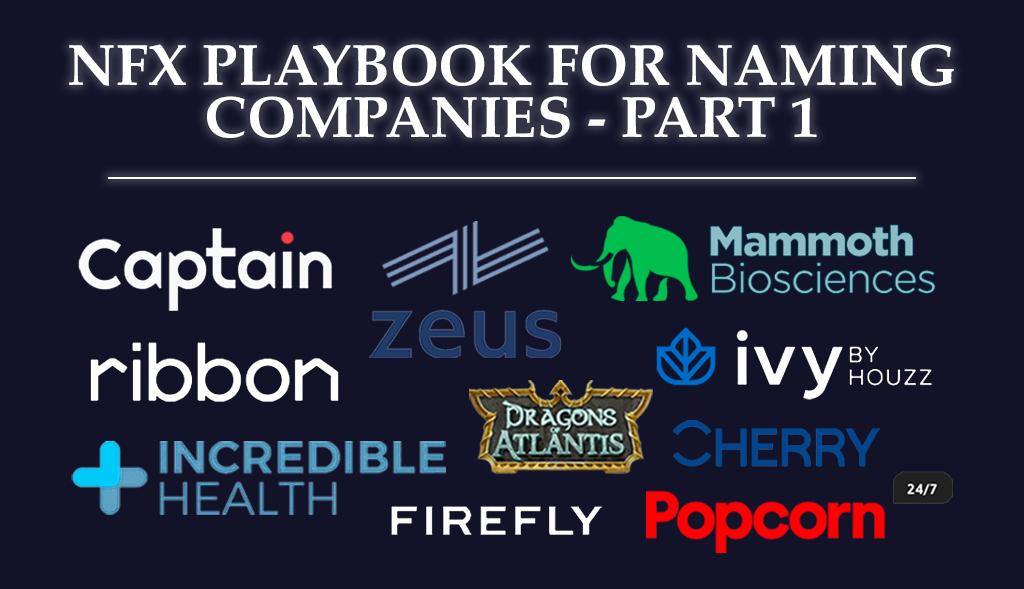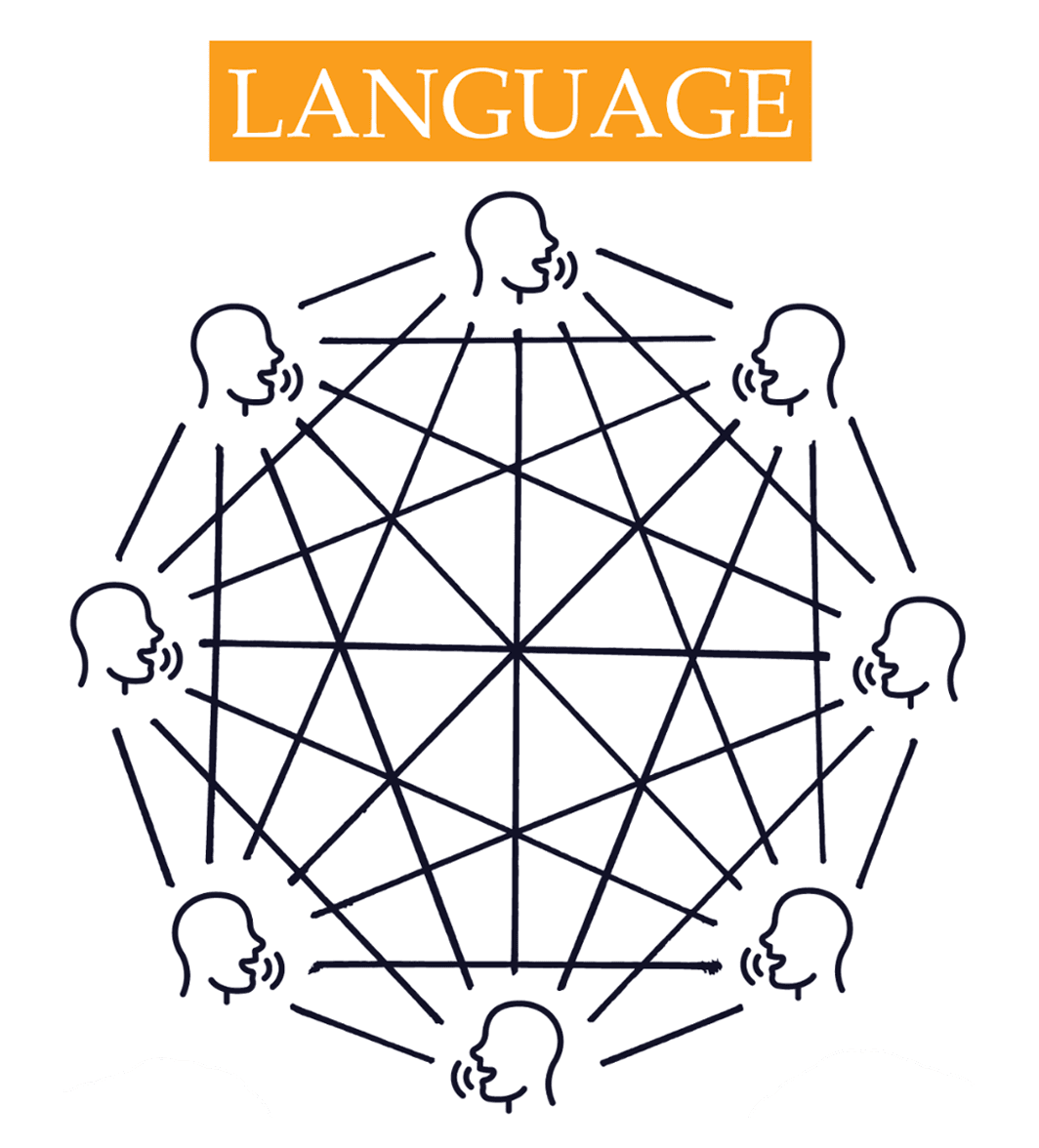

Many people who are otherwise excellent Founders and investors believe the name of your company doesn’t matter. They say it’s what you build that matters, not what you call it.
They’re wrong. It’s a blind spot for them. What you name something is vital to your enterprise. Your company is fundamentally a network of humans – employees, customers, investors – and language matters enormously to all of them.
Few people appreciate how a company name sets the psychological spirit of their entire company. Fewer still realize its impact on their products, culture, community, and visibility. Your company name is the language equivalent of olfaction, your sense of smell, which is known to interact powerfully with parts of the brain responsible for memory and emotion.
Language is the human OS. Language needs to be in your tool kit from the start. (What I’m saying here relates equally to your product names as well.)
You can choose a company name that elevates you, cripples you, or is invisible with no impact at all. So why not arm yourself with an advantage from the start?
Proof that naming matters a lot
I personally woke up to the power of company names when we screwed up my startup’s name in 1999. We called it Emode. In hindsight that name was hard to spell, generic, easy to forget. It was also tied to the “e for electronic, like e-mail” fad and was dated within 24 months. With coaching, we changed the name to Tickle. Boom. Traffic went up 30%. Journalists started writing about us. Our ad spend became 20% more effective, and no one forgot our name.
What’s more, before the name change, we had an acquisition offer for $45M. Just four months after the name change, we received an offer for $110M. A name change started a series of changes in how the customers perceived and reacted to us, how investors and acquirers thought of us, and ultimately, how we thought about ourselves. The power of language increased our valuation by 2.5X.
I found that the name was like a rudder on a boat, quietly but definitively steering my company’s direction.
Consider a few more examples.
Yahoo! vs. InfoSeek
I saw a similar thing play out in the battle of the early search engines. I was an Associate at Battery Ventures when the firm invested in InfoSeek, the first U.S. search engine. InfoSeek rarely won attention from press or consumers even though they had a product that was superior to Yahoo!’s. But Yahoo! was orders of magnitude more interesting to talk about.
And the numbers showed it. InfoSeek eventually sold for $72M and Yahoo reached a peak of $120B. It was then that I started writing a playbook for naming companies . In many cases, what we call things is equal to or more important than how we build them.
“They nailed the name”
In May of 2007, I wrote a blog post titled “Twitter, a great investment for someone.” I said there were two reasons Twitter would be a big deal, and one of them was that “they nailed the name.” It was clear even back then that the Twitter name and the language convention of “tweeting” were a big asset, providing wind to the back of the company. How much did it matter? I estimate it mattered a lot – and still does.
Dragons of Atlantis
When we were running a gaming company 10 years ago and needed to build a new game, we reversed the normal order of things. Instead of thinking through the experience we wanted users to have and then naming the game, we came up with the name first. We tested different names using Facebook ads to find out the most clickable name. Once we had the name, then we thought about what game experience we needed to build to fulfill the promise of that name. That game saved the company and went on to do more than $100M in revenue. Name first.
Mammoth, Zeus, Captain & more
Working with the Founders, we came up with the name Mammoth for Mammoth Biosciences in my garage in Palo Alto. As their Founder and CEO Trevor Martin recalls: “Somehow we got on animal names, and I think the Mammoth is definitely something that’s really come to characterize the company. It was also a bit cheeky in terms of being a twist on the idiom, like the elephant in the room, but it’s even bigger and you can’t ignore it. It was also a prophetic name — that this was going to be a Mammoth-sized company.” Today, just 5 years later, Mammoth is valued at over $1Billion.
Here are just a few of the startups we at NFX have helped name in recent years: Mammoth, Incredible Health, Firefly, Ribbon, Ivy, Captain, Cherry, FilmHub, Popcorn, Zeus.
It’s still early-days for many of these companies, and having a great name doesn’t ensure success. But the Founders report that these names have had a powerful impact on their metrics and their progress.
Why does a name matter so much?
It’s psychological.
People often aren’t aware of the impact your name is having on them. What emotions it evokes in them. Whether they think you’re strong or trustworthy or friendly or expensive. It sets expectations of your company in the blink of an eye. And first impressions are hard to change. Both positive and negative.
When you’re not in the room, the name of your company is what gets passed between people. It speaks for you when you’re not there.
It also speaks for your customers, when they tell friends about you.
You need your name to say the right things.
How to get your company name right
The process for naming your company is different depending on the Founders, the dynamics between them, how self-aware they are, and how far along they are in understanding their customer and their market landscape.
The key is identifying the core feeling. It’s much more right-brained and high EQ than left-brained and book smart.
Some Founders are attuned to the core feeling they want to evoke, and that’s the right way to do it. Others are so focused on the problem and solution set they are tackling that they get too descriptive instead of evocative. Make sure you can describe how you want your user or customer to feel when they first hear or see your company name. How do you want them to feel when they use what you’ve built. When they tell a friend about it?
Once you’ve figured this out, it’s time to be a word collector. We usually create 15-100 name options using online resources, a lot of Googling, getting ideas from good language people, and asking friends for their ideas (not their judgments). Then we sift through them. We do all this using the guidelines below.
Do’s
1) Be evocative. Evocative names have emotional texture. They tap into people’s feelings, memories, and longing. Use language to mainline into their limbic system, the brain area that regulates emotion.
Jack Dorsey understood this in his naming of Twitter. He told the LA Times back in 2009: “Mobile was a big aspect of the product early on. We liked the SMS aspect, and how you could update from anywhere and receive from anywhere. We wanted to capture that in the name — we wanted to capture that feeling: the physical sensation that you’re buzzing your friend’s pocket. It’s like buzzing all over the world.
So we did a bunch of name-storming, and we came up with the word “twitch,” because the phone kind of vibrates when it moves. But “twitch” is not a good product name because it doesn’t bring up the right imagery. So we looked in the dictionary for words around it, and we came across the word “twitter,” and it was just perfect. The definition was “a short burst of inconsequential information,” and “chirps from birds.” And that’s exactly what the product was.
The whole bird thing: bird chirps sound meaningless to us, but meaning is applied by other birds.”
It’s clear to me that he intuited the power of Language network effects, very early on.
2) Make it memorable: Make sure you and other people remember it without cues 3 days after they first hear it.
3) Make it spell-able. Type-able. Uber, Zoom and Tesla are great examples. Qwikster was bad; Netflix is better. Chainalysis or Consensys are tough pills to swallow.
How someone speaks and hears your company name matters, too. My company Emode was often mis-heard as Emote.
More famously, Amazon was originally incorporated as Cadabra, as in ‘abracadabra.’ But a year later, Jeff Bezos changed it to Amazon, partially because he was concerned that people could mishear cadabra.com as cadaver.com.
4) Be friendly with your name, like Apple, Ripple, Twitter, Candy, WorkDay, DoorDash, SurveyMonkey, PayPal, Google, Ribbon, Twilio.
5) Being a little controversial is okay. A great name might hit 10% of the people wrong, like Grindr, Tickle, Banana Republic, Monster, or Virgin. There’s a bite to it. But being on the edge is what makes it stick.
6) Talk to people who really speak for your customer. Once you’ve narrowed down to a few name options, ask what they feel when they hear each one. This is the best diligence you could do.
7) Consider what it looks like when your company name becomes a verb. Examples include, “I’ll uber to the party” or “I’m going to slack you the notes from our meeting.”
8) Unlearn what you think you know about naming. It’s different for every company. And most people learned it wrong. As Adam Grant said in conversation with my partner Pete Flint, “When Founders get too attached to their existing patterns of thinking, they become prisoners of their own prototypes.”
Don’ts
1) Don’t be “descriptive” like HipChat, DailyBooth, Weatherbug, MySpace. It worked for Salesforce, but that’s an exception, not a rule. “No fluff” was a Salesforce mantra that went well with the spartan name.
2) It shouldn’t take more than 10 days to pick your company’s name. Language matters, but so does speed. Give yourself a fast deadline, otherwise the process gets fraught with too many opinions, feelings, and indecision. You’ll know what you need to know inside of 10 days.
3) Don’t feel married to the name for the rest of your life. It’s important to realize a Seed stage company can change its name again later if it no longer fits what you want to convey as the business evolves. It happens all the time. Tiny Co became Slack, Cadabra became Amazon, Odeo became Twitter, Geni became Yammer, and so on.
4) Don’t ask everyone their opinion. Just ask the few people who really speak for the customer. Or the few people you have in your circle who are good at language and the emotive reactions to words. Not a lot of people have this skill.
5) Also don’t over index on the opinions of your immediate circle of family and friends. Often these people have strong opinions and also have a lot of affect on you. But they don’t necessarily know what makes a good name. A Founder’s desire to listen to this group is one of the biggest obstacles to getting your company name right.
6) Don’t allow for more than one name. It’s tempting for different people in your organization to want to name products and subsidiaries. It gives them a sense of ownership and happiness. But it disperses the energy of your company. Trying to build more than one brand is nearly impossible for a startup. You have to coalesce around one and put all your effort behind that one name in order to have a chance. So don’t have two or more names you’re supporting. Don’t name your products different from your company. It’s confusing for customers, employees, press, investors, and acquirers. I know you don’t want to believe this. It’s too much fun proliferating names, isn’t it? There’s so much emotional energy and excitement at starting something NEW, right? Don’t do it. Don’t do it.
Language Network Effects: Winner-take-most
People coalesce around a set of language for mathematical, inevitable reasons – check out the spooky Zipf’s Law for proof. In short, language conforms to “winner-take-most” network effects.


Startups can use the network effects of language to leverage the winner-take-most effect in at least two ways: first, in creating business category language; and second, in getting their company name to be a verb.
With the first, if you can create a name for a business category and then be known as #1 in that category, it gives you solid language network effects.
Miller Beer did this in 1975 when they created the “lite beer” category. We’ve seen this same language network effect with Bitcoin, being seen as #1, and the creator of the cryptocurrency category.
In these cases, the #1 either lost or will lose its crown eventually, which is why language network effects on their own are considered less strong than others. Nevertheless, for many years, their competitors certainly complain about the unfair advantage of the company with category language network effects.
The second way companies typically take advantage of language network effects is when they get people to use their company name as a verb. For instance, when “Googling” something became synonymous with searching for something on the Internet, it was a huge advantage for Google. The language itself became an impediment to using a competitor. When someone asks you to Google something, it’s both socially awkward and mentally jarring to pull out your phone and start using Bing. It’s similar to someone saying “grab an uber.” They’re giving you a social cue to use Uber, not Lyft.
Getting people to verbally use your company name is a big advantage, but it’s very tricky to do. Your company name has to be memorable and catchy enough to do this, and that’s why getting the name right is so crucial. Yahoo tried to make this happen, they put up billboards and ads saying “Do you Yahoo?” but it didn’t stick. Ouch.
Overcoming the fear of changing your company name
You don’t always start out with the right name. Changing your company name should be used more often than it is.
40% of the early stage companies we work with at NFX choose to change their names after we invest at Seed. Why?
- First, because we really dig in with them on the power of naming and language. We walk them through this playbook – and a lot more.
- Second, as they start to change their businesses or target customers, it often makes sense to rename.
- Third, they want to give their teams a fresh start with a clarified mission, and a name change helps cement that shift with their teams.
Don’t let fear keep you from making the name change that could help you grab the big prize. Push through the fear of the people around you. You’re still a small company. I know you think everyone is watching you, but they aren’t. They’re busy on other things, and less than 1% of your potential audience has heard your name. Worry about the 99%. Are you playing to win, or just playing not to lose? World-class founders play to win.
[Note: This is Part 1 of our naming playbook. Part 2 and 3 are things we share with the NFX Guild members after we invest.]
As Founders ourselves, we respect your time. That’s why we built BriefLink, a new software tool that minimizes the upfront time of getting the VC meeting. Simply tell us about your company in 9 easy questions, and you’ll hear from us if it’s a fit.
